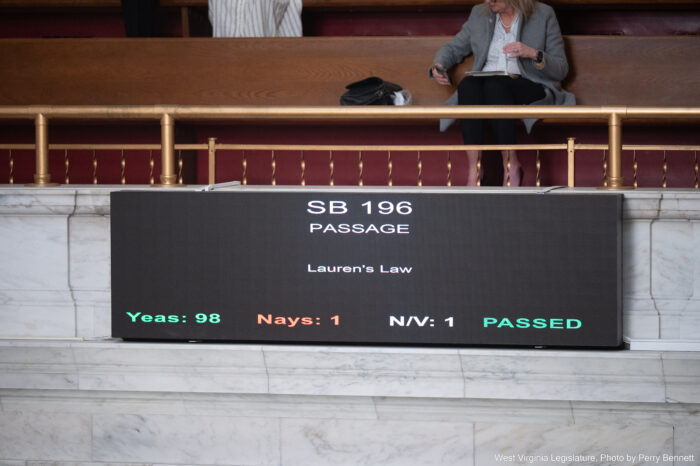Lauren’s Law passed the House of Delegates Friday with only one lawmaker voting against its passage.
Senate Bill 196 would raise criminal penalties for drug trafficking offenses, and is named after Lauren Cole, a 26-year-old Morgantown resident who died after ingesting drugs laced with fentanyl.
Cole’s parents were present in the Senate when the bill passed that chamber with Sen. Joey Garcia the only vote against its passage.
“We’re raising criminal penalties every single session, every single session, with the idea that there’s going to be this deterrence, and that deterrence is not getting over with people, these things don’t deter people,” Garcia said on March 11.
Proponents like Sen. Mike Deeds, R-Greenbrier, the lead sponsor of the bill, call it a “line in the sand” to keep manufacturers from distributing their illegal supplies in the state.
“Just to put this in perspective for all of us, 12 pounds of uncut fentanyl has the potential to kill 2.7 million people,” Deeds said that same day. “Our population in West Virginia is not quite 1.8 million citizens. It’s clear that we need to draw a line in the sand and protect our borders here in West Virginia, clear that every family, every child, every citizen of West Virginia has felt the impact of drug sales.”
The bill was amended earlier this week in the House’s Judiciary Committee to add clarifications around what constitutes drug delivery and to more explicitly target wide-scale drug traffickers.
Delegates Mike Pushkin and Hollis Lewis, both Democrats from Kanawha, questioned Del. J.B. Akers, R-Kanawha, in his capacity as the chair of the House’s Judiciary committee, about the broader implications of language in the bill.
“I know who we’re trying to go after here, and I fully support that you’re trying to go after big fish [but I] think when you cast such a wide net, you’re going to catch some little fish as well,” Pushkin said.
The offenders who sold Laura drugs laced with fentanyl in July 2020 were sentenced to 15 years in prison under current law. The bill would change the state’s penalties to sentence dealers to decades in prison for trafficking the same amount of drugs.
Opponents have also voiced concern about the law dampening judicial discretion during sentencing by mandating a certain amount of jail time instead of having the option to send a defendant to a recovery program or home incarceration.
“When we did this before, at a federal level, particularly in the early 90s, sort of the mandatory minimum mindset didn’t really work,” Lewis said while questioning Akers.
Akers said he disagreed, and that his committee added language to target large-scale operations instead of “street-level users,” and added language to allow judges discretion in their rulings by making mandatory minimum sentences aimed at “kingpins.”
“We have placed that back into [the] discretion of the circuit court judges that people who are actually street-level users will qualify for probation, potentially, or drug court,” Akers said. “So we’re seeking a balance here. This bill is aimed at high-level dealers, and that’s what the language clearly reflects.”
Lauren’s Law targets six drugs: fentanyl, methamphetamine, PCP, LSD, cocaine and heroin.
For the six targeted drugs, the penalty would be increased for the manufacture, delivery, possession with intent to deliver, transportation of drugs into West Virginia, and conspiracy to do any of the above. Other drug penalties are also increased, as well as limitations to probation authorization for certain offenders.
Anyone guilty of transporting one of the six listed substances into the state would also face stricter penalties if this law is enacted, up to 30 years for more than five grams of fentanyl.
The Senate has until midnight Saturday to concur with the House’s changes to the bill.


























